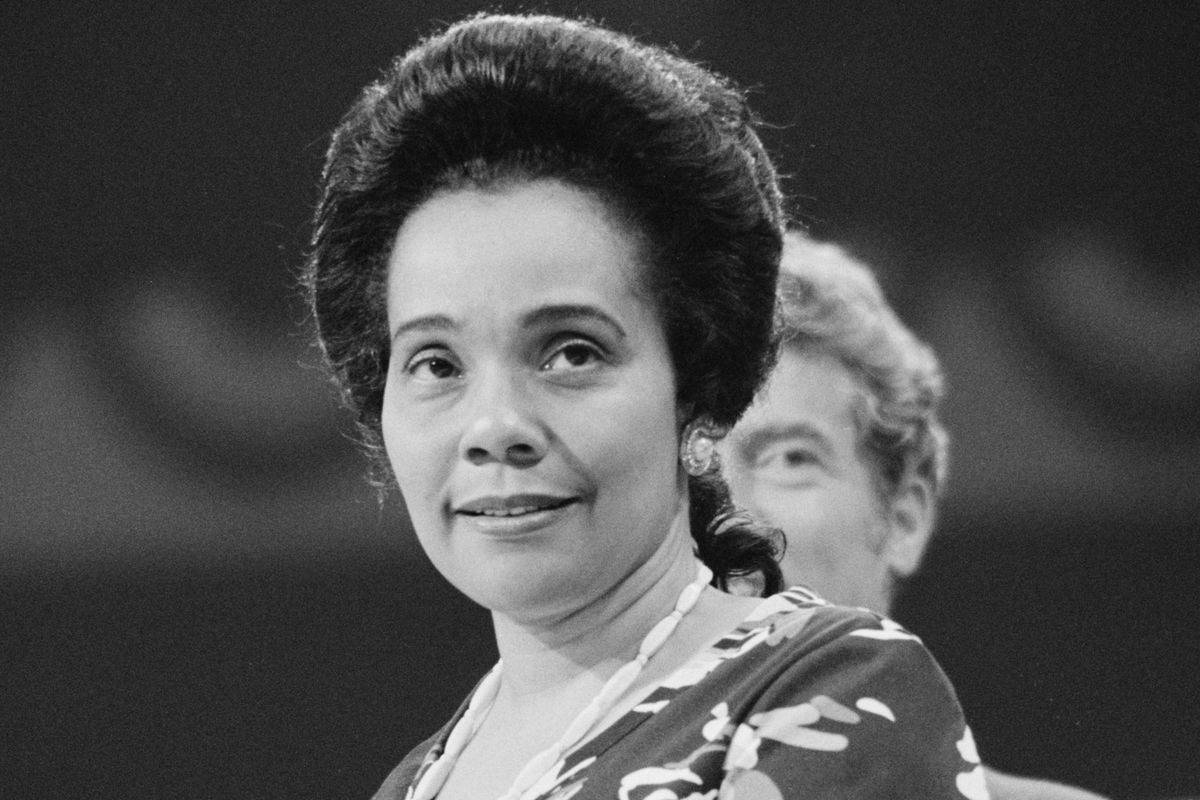As we celebrate Black History Month, we cannot forget about the legacy of Coretta Scott King
Like her husband, Coretta Scott King was a visionary to be reckoned with, championing for justice and equality long after her husband was gone

The 1st of February marks the commencement of Black History Month, an annual celebration of accomplishments by African Americans and a time to reflect on their central role in U.S. history. Among those individuals we like to pay tribute to is none other than Coretta Scott King - the wife of civil rights leader Martin Luther King Jr.
Almost everyone is familiar with the man who fought tirelessly for racial equality, leading the Montgomery Bus Boycott, as well as the March on Washington in 1963. But as we celebrate the remarkable work of Dr. King during Black History Month, we can't forget about the remarkable legacy his wife, Coretta, left behind.
Like her husband, Coretta Scott King was a visionary to be reckoned with, fighting for justice and equality long after her husband was gone. Born in Marion, Alabama, Mrs. King had an immediate fondness for music. Before receiving a BA in music from Antioch College, Mrs. King was valedictorian of her high school, as well as lead in the choir.
After graduating Antioch College, Mrs. King was awarded a scholarship to continue studying music at the New England Conservatory of Music in Boston, Massachusetts. This is where she was introduced to her soon-to-be husband, Martin. Coretta and Matin met when Martin was working on his Ph.D. at Boston University's School of Theology, and after a year and half of dating, the couple married in 1953.
One year later, Mrs. King graduated from the Conservatory of Music, and she and Martin moved to Montgomery, Alabama; the birth place of the Civil Rights Movement. Although Mrs. King took on the role of being a supportive wife to her husband, she maintained a form of autonomy within her marriage to Martin.
This was first apparent in her wedding vows.
"I had made up my mind that I wanted the traditional language about 'obeying' and submitting to my husband deleted from our marriage vows," Coretta wrote in her book My Life, My Love, My Legacy. "The language made me feel too much like an indentured servant." Daddy King and Martin surprised her by not objecting to this choice.
As you honor my father today, please honor my mother, as well. She was the architect of the King Legacy and founder of @TheKingCenter, which she founded less than three months after Daddy died. Without #CorettaScottKing, there would be no #MLKDay. #MLK #BelovedCommunity pic.twitter.com/cLvgTjeUwE
— Be A King (@BerniceKing) January 18, 2021
Wanting to sustain her independence, as well as her career as a performer, Mrs. King was initially uncertain about marrying so soon, a fact she stated in her book. After becoming engaged to Martin, Corretta changed her major from performing arts to to music education. This allowed Mrs. King the ability teach should she and Martin need additional income; a move that was unconventional for women during the 1950s.
While balancing motherhood and marriage, Mrs. King also incorporated Movement work in her routine, which included speaking before church, civic, college, fraternal and peace groups. In addition, Mrs. King acted as a mediator to public officials, and was a liaison to peace and justice organizations during her husband's stand on the Vietnam War in 1967.
In 1968, Mrs. King founded The Martin Luther King, Jr. Center for Nonviolent Social Change, less than three months after her husband was assassinated. She spent an immense amount of energy, building and developing programs for the center throughout the years.
As if that wasn't impressive enough, Mrs. King led goodwill missions throughout Africa, Latin America, Europe and Asia, while delivering messages of peace at numerous justice rallies. In 1962, she served as a Women's Strike for Peace delegate to the seventeen-nation Disarmament Conference in Geneva, Switzerland. What's more, she was also the first woman to deliver the class day address at Harvard, and was the first woman to preach at a statutory service at St. Paul's Cathedral in London.
Mrs. King has always been a supporter of the Women's Movement, and was vocal about the lack of female representation during the beginning stages of the Civil Rights Movement. But in 1974, Mrs. King created a coalition of over 100 religious, labor, business, civil and women's rights organizations, dedicated to a national policy of full employment and equal economic opportunity.
She was even Co-Chair of both the National Committee for Full Employment and the Full Employment Action Council and wrote several books on her life with Martin. I had to take a breath simply from reading all those accomplishments out loud. So, as it stands, we cannot celebrate Martin without celebrating his better half. While Martin may have been the person to initiate the Civil Rights Movement, it was definitely Coretta who continued honoring that legacy was he was gone.
- Black History Month films and documentaries that are hard to watch - Indy100 Conversations ›
- Why Women's History Month is in March - and how you can celebrate it this year - Indy100 Conversations ›
- Inspiring ways to celebrate Women's History Month—and women all year round - Indy100 Conversations ›
- Coretta Scott King | Biography, Books, Award, & Facts | Britannica ›
- From Coretta Scott King to Ella Baker: These women's ideas were ... ›
- Read Coretta Scott King's Letter That Got Sen. Elizabeth Warren ... ›
- Read the letter Coretta Scott King wrote opposing Sessions's 1986 ... ›
- Coretta Scott King - Death, Quotes & Facts - Biography ›
- Coretta Scott King | National Women's History Museum ›



The best lifestyle YouTubers I follow that you've never heard of